Before I talk more about budget categories, I want to take a moment to talk about budgets. Budgets are important because they give us a roadmap of where we want our money to go. They help us make sure we have money for the things in life that are important to us AND to give us a plan so we can reach our financial goals.
When it comes to creating a budget, it’s important to create budget categories. Why? Budget categories help us to lump similar expenses together, so that we can look at the totals for each group, or category, instead of dozens of individual line items. These categories give us a quick picture of our overall finances, so that you don’t get lost looking at all the details.
There are no pre-set categories for your personal budget. You have to create them for yourself – and that’s a good thing. Any budget should reflect your life, your goals and your values. How you look at those numbers will also depend on your personality. For example, do you like details or do you want a more high-level view? So, go ahead and personalize your budget!
“Everything you spend needs a line in your budget, even gifts and other miscellaneous spending. Have a plan for it.”
Dave Ramsey
To help you create your own budget categories (and decide what items to include in each category), I have created the following list. Feel free to modify and change it, so that it reflects YOUR life and what groupings make sense for you!
Budget Categories for Income
The very first line of any budget is income and other money coming in. It’s how we know how much we can spend or allocate on all the other categories in our budget. Some family budgets are simple and only have one or two sources of money coming into the household, while other budgets are more complex, with multiple streams of income.
Your income categories should include all sources of money coming into your household, whether they’re from a regular or irregular basis. Here are some items to include under income:
- Regular paycheck
- Bonus or commission
- Side hustle money
- Interest (from investments)
- Any money received from the government (for example, child benefits)
- Alimony payments
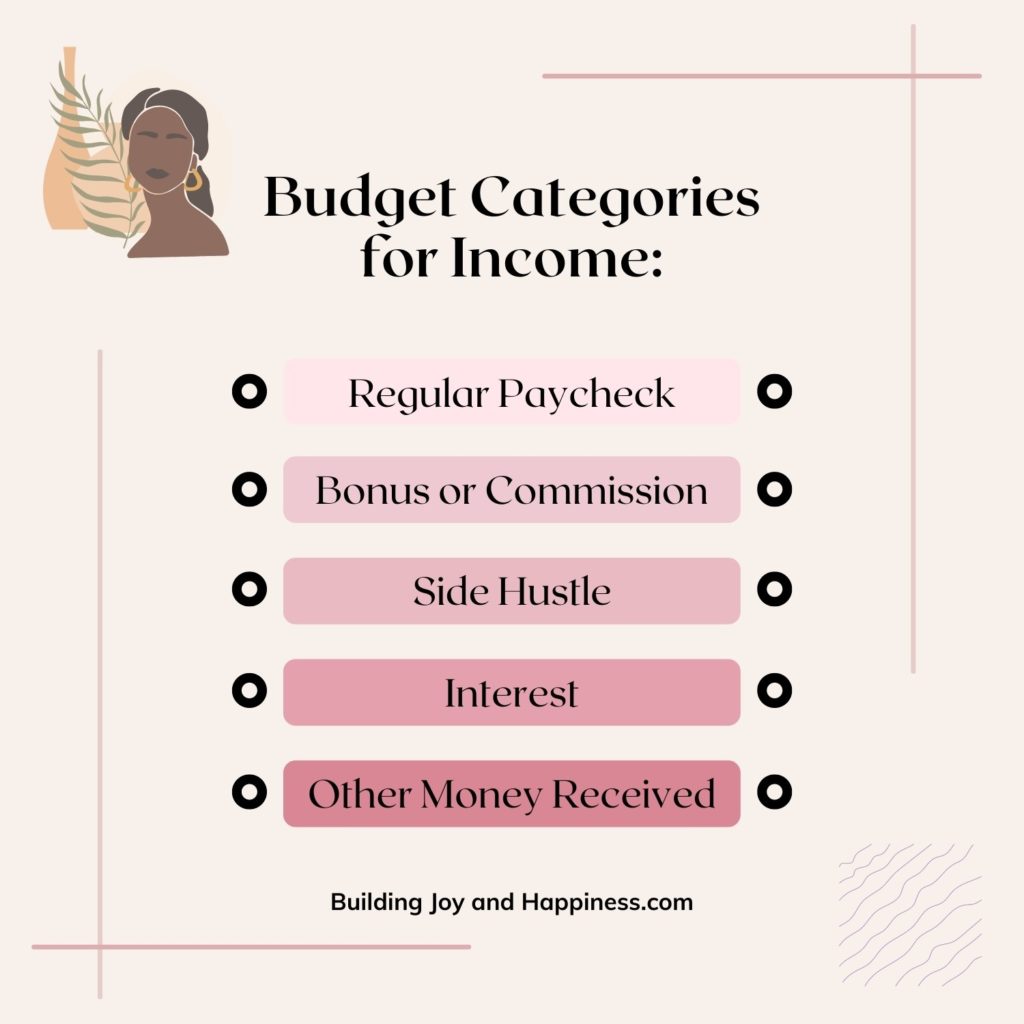
Budget Categories for Housing
The purpose of this category is to capture any expenses that are related to your home, including rent or mortgage payments. Until you pay off your mortgage, this category will make up a large percentage of your budget. Even after you are mortgage free, there will still be enough expenses flowing through to make it worthwhile for housing to be a separate category.
So, in addition to budgeting for rent or mortgage payments, your housing category will include items such as:
- Rent
- Mortgage payments
- Condo / HOA (home owner’s association) dues / Maintenance fees
- Household appliances
- Household Repairs
- Heating systems (eg: furnace) and cooling systems (eg: air conditioning)
- Landscaping
- Lawn Care
- Alarm systems
- Property taxes
- Furniture and décor items
- Purchases from stores like Home Depot
Budget Categories for Utilities
Well, utilities are all the different things that you need to keep your house operating and supporting you and your family. It’s things like having power to operate appliances, being able to take a shower and even the shows you watch on tv.
So, what expenses should be included in your utilities budget category? This will include things such as:
- Electricity
- Water
- Phone
- Natural gas
- Sewer
- Trash
- Heating
- Cable / TV streaming subscriptions
- Internet
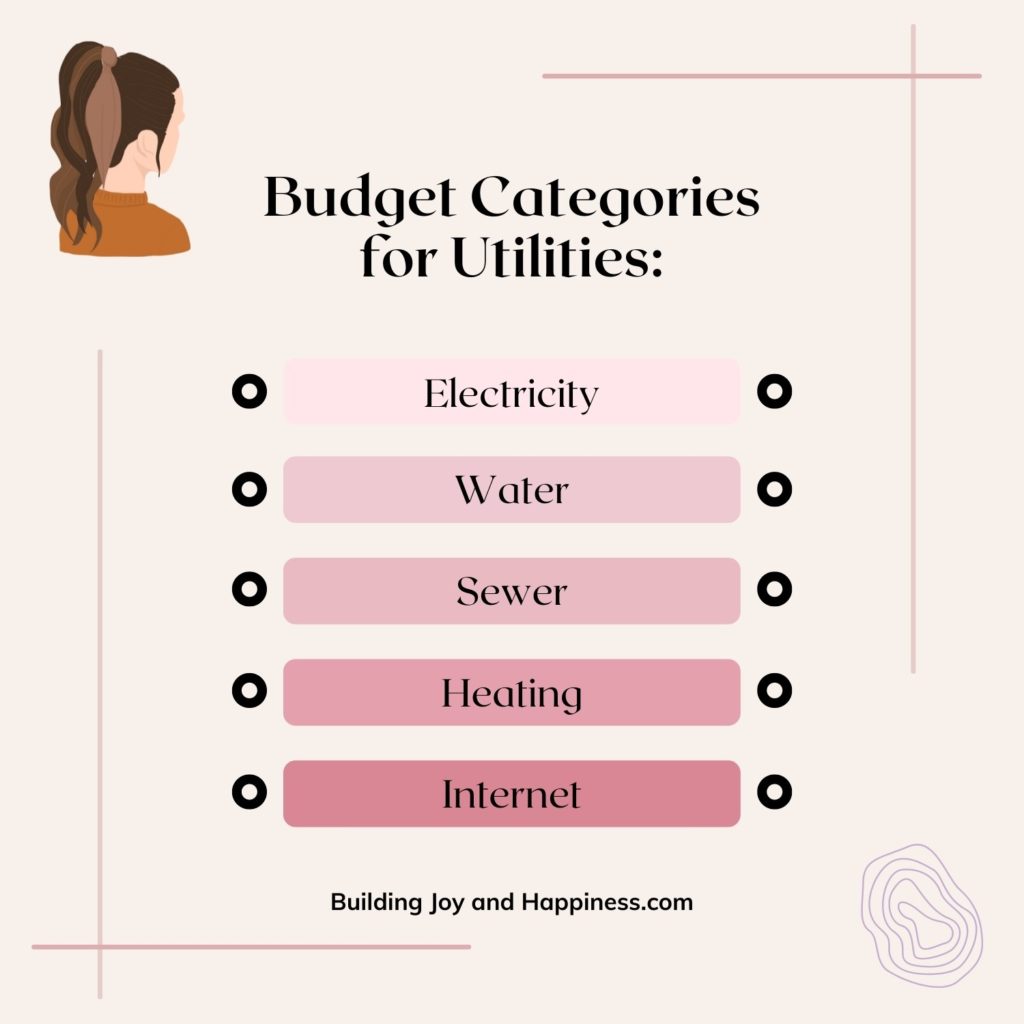
Budget Categories for Transportation
Whether you take transit, use taxis, drive your own vehicle (or use a combination of these methods), transportation is another major category you need in your budget. It’s all the expenses related to moving you around – to work, shopping, visiting friends, appointments, and more!
Transportation isn’t just the cost of taking transit or paying your car lease/loan. It’s important to include all the costs that go along with moving you around, such as:
- Transit
- Taxis / Uber
- Car / vehicle lease
- Gasoline
- License and registration fees
- Vehicle repairs (including oil changes)
- Tires and tire storage
- Parking
- Tolls
Budget Categories for Food / Grocery Store Items
Your food budget is another category that will make up a significant portion of your budget. While this category may seem simple, there are a few things you will have to think about when setting your budget amount and when tracking your spending.
As you may notice, one item that I haven’t included here is the cost of eating out at restaurants, fast food joints and coffee shops. For me, I’ve included those costs under “Entertainment”. Eating out is expensive, but completely optional, so I don’t like to “hide” the expense under food. However, that’s my opinion and you don’t have to follow me. If it makes more sense to you to include the cost of eating out under food, please do so. It’s your budget!
The other item I would like to point out is all the other items you buy at the grocery store, like toothpaste and laundry detergent. While they’re not food, you probably buy them at the same store. When tracking your expenses, you don’t need to separate out each item on your receipt. Keep it simple and simply record the total in the category that makes the most sense to you.
If you’re looking for a way to reduce your food budget, check out my blog post about tips on how to save money on groceries.
Here’s a list of expenses to include under food:
- Groceries and food (obviously)
- Toothpaste
- Hygiene / toiletries
- Shampoo and conditioner
- Deodorant
- Vitamins and supplements
- Laundry detergent
- Cleaning supplies
- Diapers
- Farmers market
- Meal kits
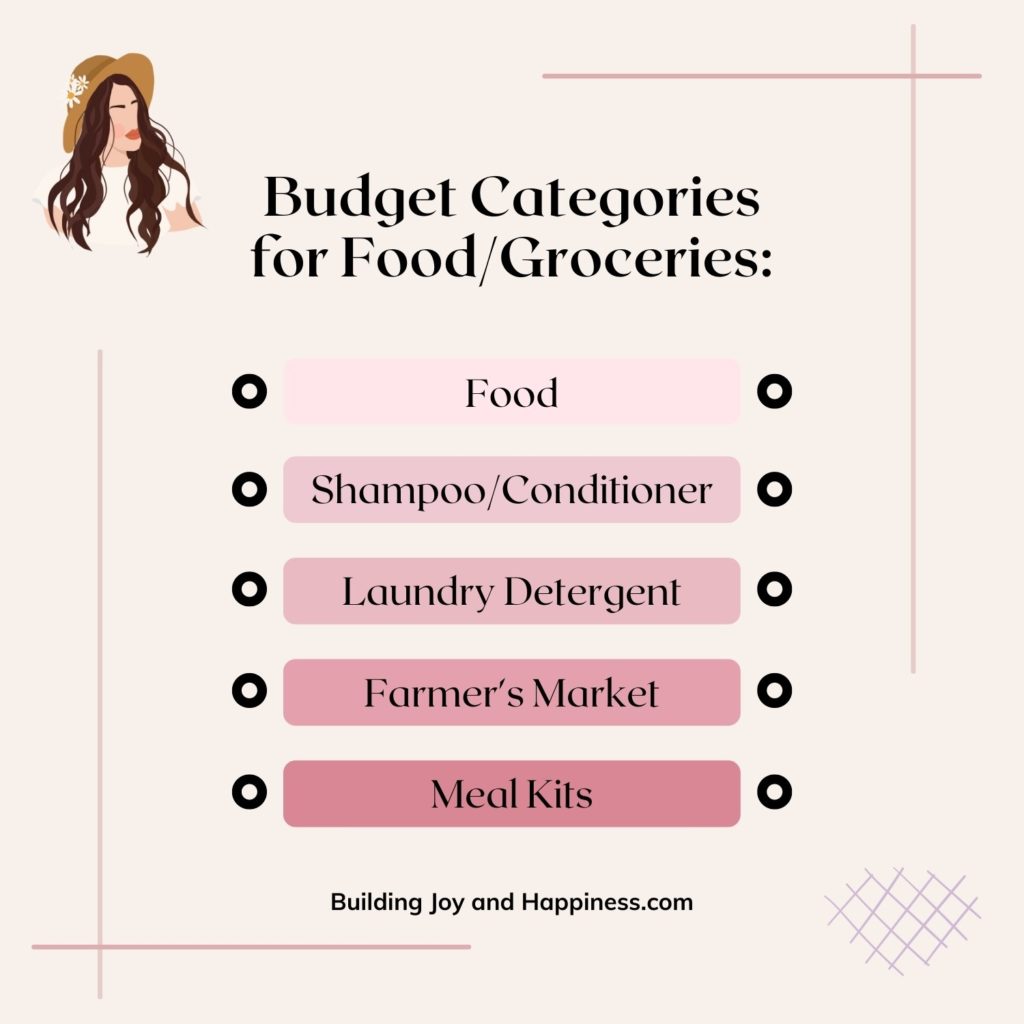
Budget Categories for Insurance
The decision to have insurance as a separate category is a personal decision, depending on how many different types of insurance you have. You may prefer to include these items in other categories, for example: home insurance could go under “Housing”. Either way is perfectly acceptable – as long as your insurance expenses are included in your budget!
It can be easy to overlook insurance, so here are some different types that you can include in this category:
- Life insurance
- Home insurance
- Renters insurance
- Vehicle insurance
- Healthcare insurance
- Pet insurance
- Disability insurance
- Long term care insurance
Budget Categories for Healthcare / Medical Costs
Healthcare and medical costs will vary for each family, but it’s still an essential part of any budget. As with any costs, it’s important to look at your regular or expected expenses (such as going to the dentist) and irregular expenses that you don’t incur each month or even every year (such as glasses).
Keep the above points in mind, some things to include in your healthcare category are:
- Prescription medication
- Prescription eye glasses
- Dental care
- Braces
- Therapy
- Massages
- Health deductibles
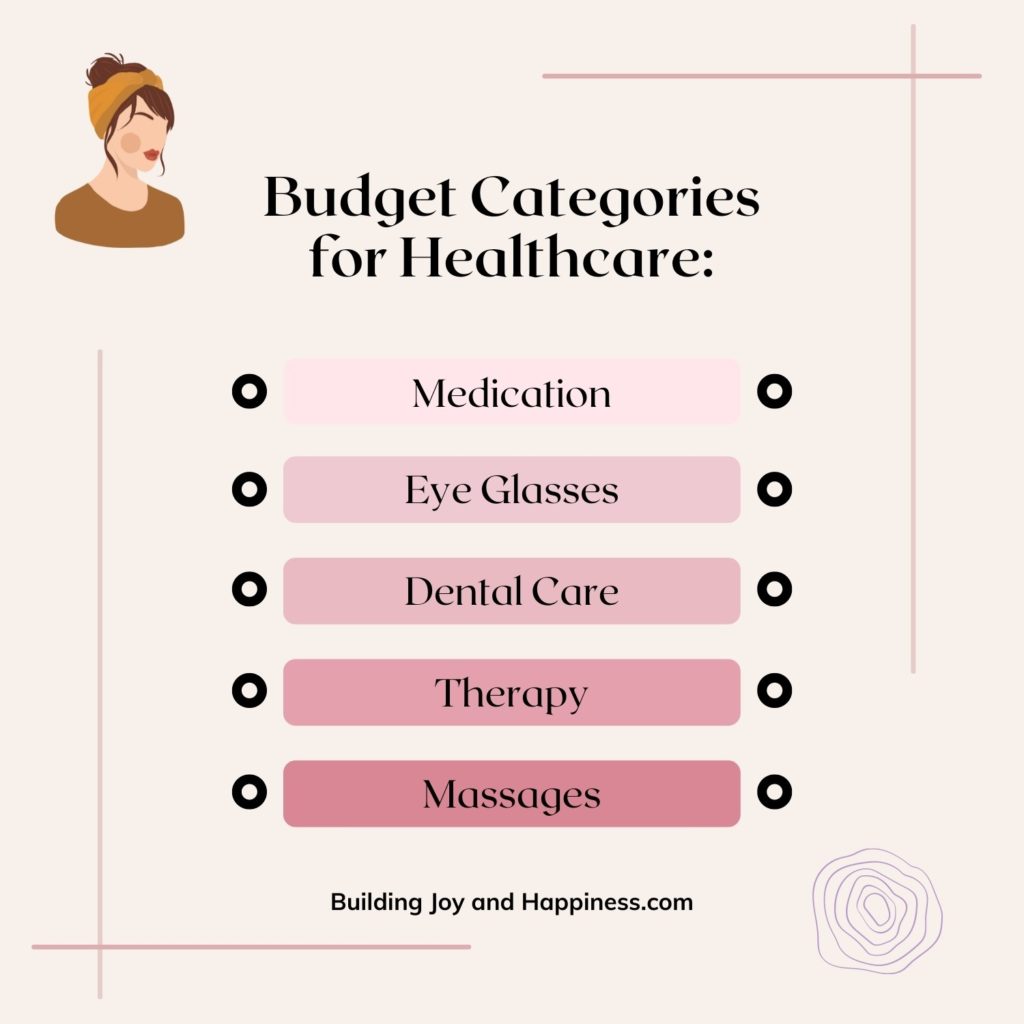
Budget Categories for Kids
If you have kids, you know they are the most important part of your family, so they deserve their own category! Your budget for kids will vary over the years and will depend on their age and interests. For example, babies and toddlers require daycare, but after a few years that turns into before/after school care and summer camp.
One item that isn’t in the following list is clothing. I’ve included that item under the “Personal” budget category where I include clothing, but again, this is a personal choice. So, do what makes sense for you.
Here are some items to include under the kid’s category:
- Child care
- Summer camp
- Extra curricular activities, such as sports or music lessons
- School supplies
- Tuition
- Tutoring
- Child support
- Allowance
- Birthday parties
Budget Categories for Personal
Everyone needs to take care of themselves, so of course there should be a category for doing just that! This category includes everything from courses, classes, clothing, makeup and more.
Quick tip: once you’ve budgeted an amount for your regular purchases and memberships, add an amount on top of that for the extras, like clothing. Then, if you don’t use up all of your budget one month, you can take the remaining amount and carry it forward to future months.
Here are some fun items to include in your personal budget:
- Gym memberships and fitness classes
- Clothing
- Dry cleaning
- Hair care / beauty
- Health and wellness / spa
- Miscellaneous shopping
- Personal development
- Purchases from stores like Walmart
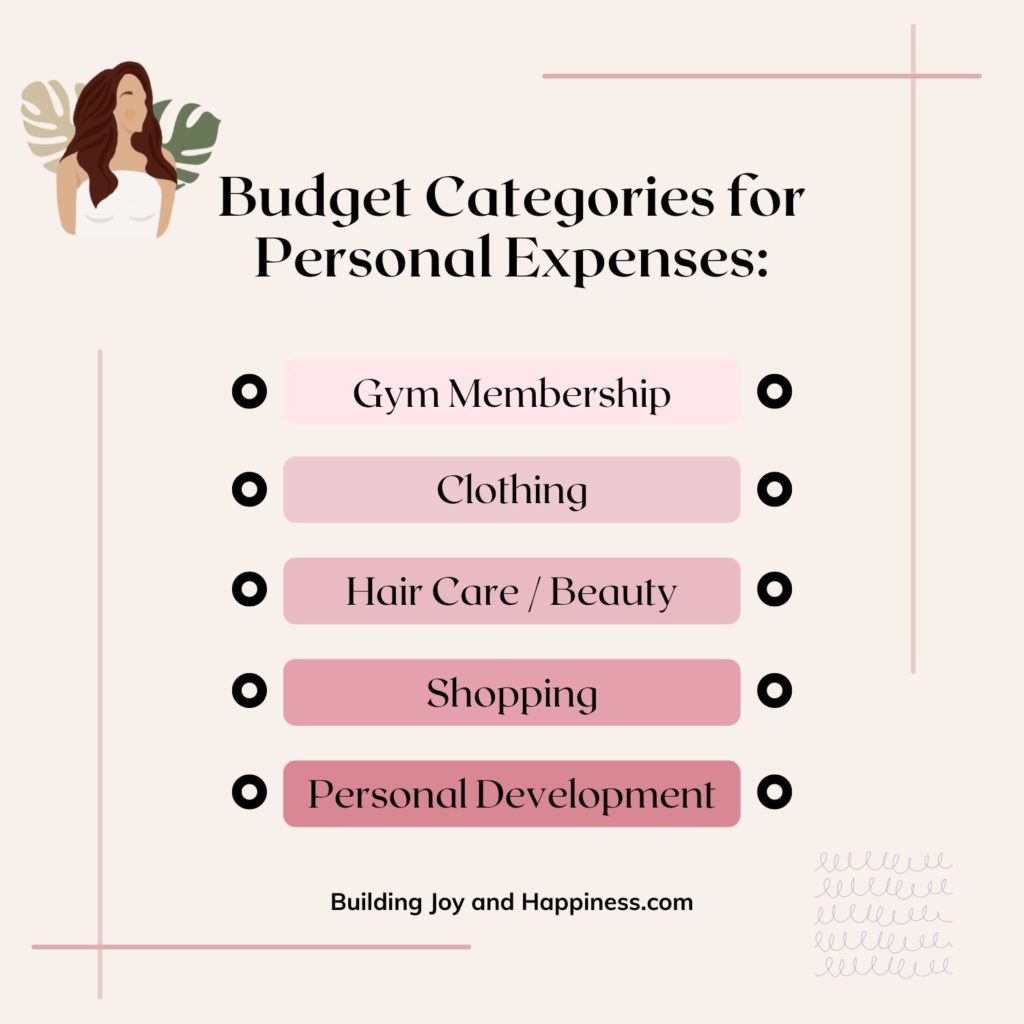
Budget Categories for Entertainment
Entertainment is an excellent example of a discretionary expense – that is nonessential spending. If necessary, these are expenses that you can cut out and still survive. So, if you need to reduce your spending, this is a good place to start. But if you have the money, it’s important to put some money towards entertainment and enjoy life!
One item that I would like to talk about is restaurants. Technically, this is a food item, but I think it’s important to separate it out from food. This allows you to see how much you spend eating out, because it really does add up. Cooking at home is always cheaper than eating out.
Classic expenses that you can include under entertainment are:
- Restaurants (this also includes items like fast food and food delivery)
- Books
- Electronics
- Concerts / events
- Movies
- Hobbies
- Memberships
- Subscriptions
Budget Categories for Pets
Pets are important family members too, as they bring so much joy and comfort into our lives! How much you need to put in your budget will vary, depending on the type of pet you have (think fish vs a cat or dog), their age/health and general upkeep of the pet. Therefore, remember to consider all of these points as you set your pet budget.
Note: If you buy your pet food at the grocery store, it’s okay to budget and record that expense under food. It might be more accurate to separate it out, but it’s more important to keep your budget simple, so that you stick to it!
Here are some common costs that you can include under pets:
- Grooming
- Pet food
- Toys
- Supplies
- Pet sitter / daycare
- Veterinary bills
- Pet medication
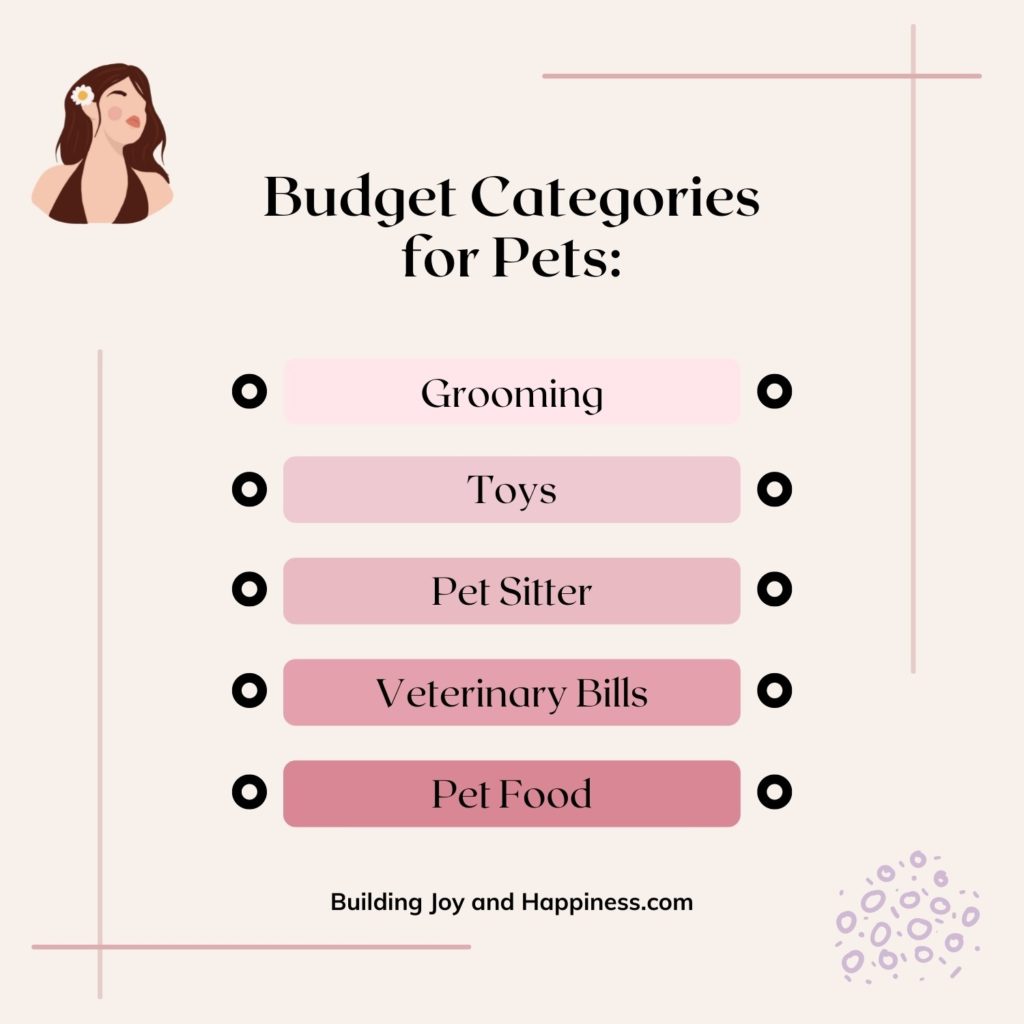
Budget Categories for Travel
Life is meant for adventure! If you love to travel, it needs to be in your budget. However, if you love to travel, but don’t think you have enough money, then you need to check out my blog post on “How to live below your means and still enjoy life”. One of the tips I share is about how to make travel affordable (hint: it involves being flexible and creative)!
Here’s a quick list of items to include in your travel budget:
- Vacations
- Hotel
- Car rentals
- Airfare
- Cruises
Budget Categories for Debt Repayment
I strongly feel that paying off all your debt (other than a mortgage), is something that needs to be prioritized. I know that this a value I picked up from my parents, because:
1) for them, carrying debt was frowned upon, and
2) when they were young, it was much harder to get credit than it is for my generation.
The other reason I make paying off debt a priority, is because you’ll end up paying a shit load of money in interest charges over time. That’s money I’d rather use for something else. What are your reasons for being debt free? Remember those reasons – write them down if you have to – and use them as motivation to pay off your debt.
Items that fall under debt repayment include all forms of debt (except for mortgage payments):
- Credit card debt
- Vehicle loan
- Personal loans / lines of credit
- Student debt
- Medical bills
- Loans from family or friends
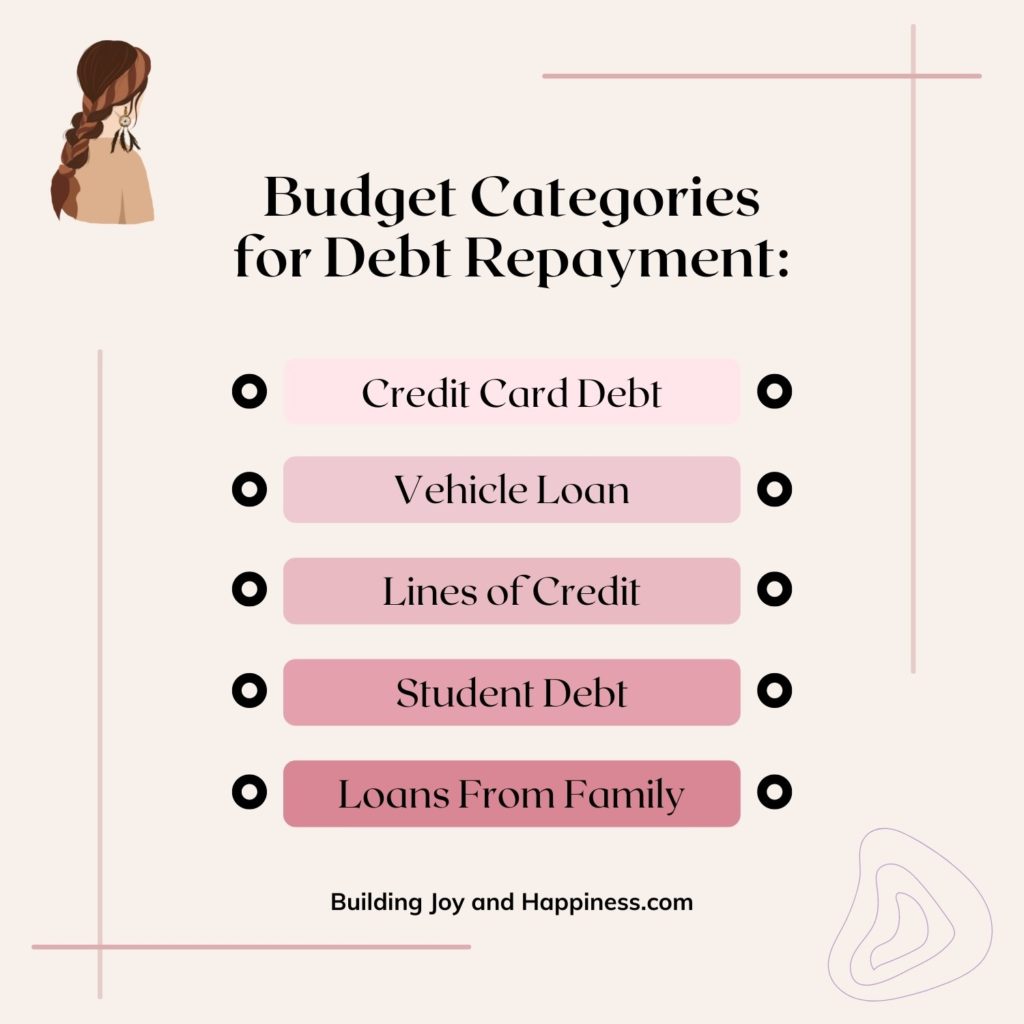
Budget Categories for Other
It may sound funny to have a category for “other”, but it really does work! There are many times where expenses just don’t fit into another category. Or perhaps you just want to separate out certain items. Whatever your reason, just know that it’s okay to have a category for other or miscellaneous items.
So, what items go under “Other”? Items you can include are:
- Miscellaneous expenses
- Gifts
- Special occasions
- Donations
- Anything that doesn’t fit into another category.
Budget Categories for Savings
When creating a budget, the main focus is usually on making sure all of your expenses have been captured. That’s why it can be easy to forget that savings also need to be included in your budget. It’s important to understand what you are saving for and why, so that you won’t be tempted to spend the money on something else!
Here are some items to include in your savings category:
- Retirement fund
- Investments
- Emergency fund
- Sinking funds
- General savings accounts
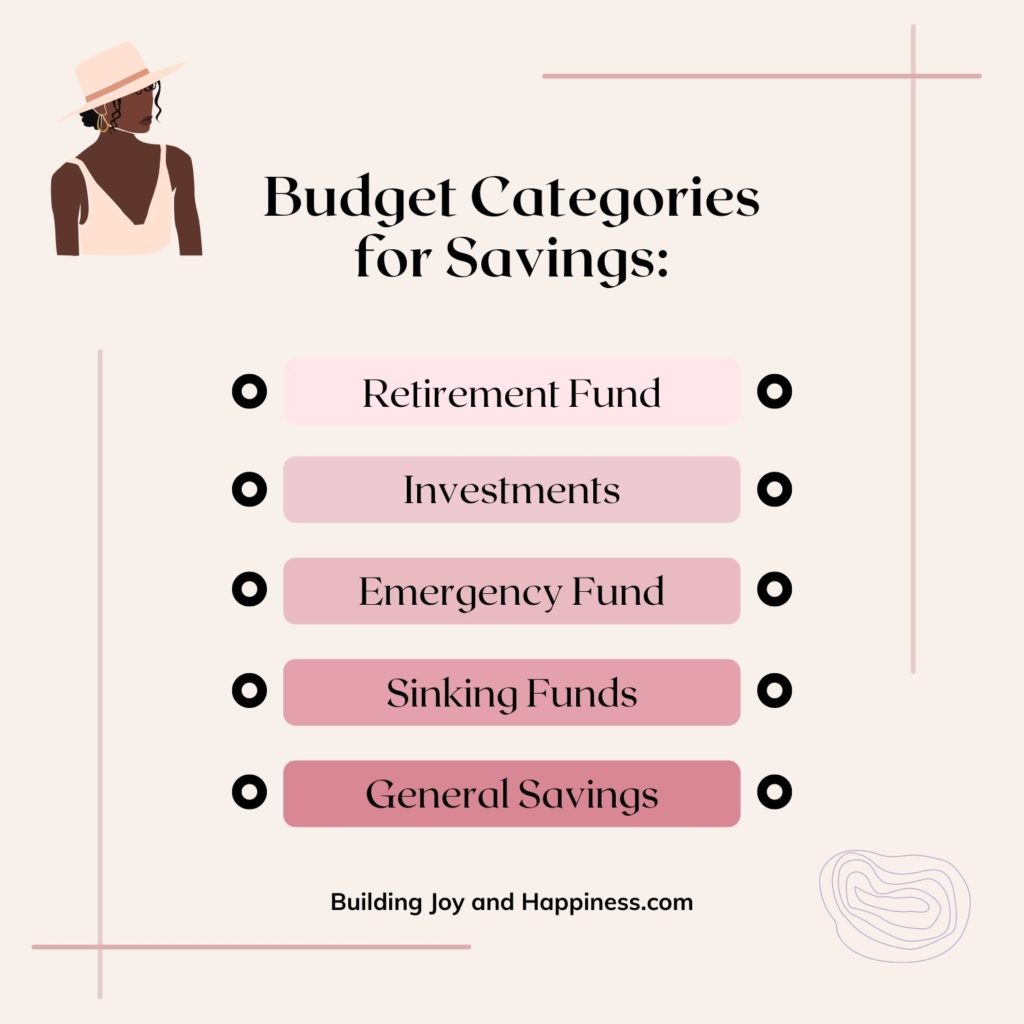
Creating a budget is a very personal experience and the same is true of the categories that make up your budget. Not every person will need all the above categories – for example, I don’t have pets, so I don’t need to include a category for pets. You might want to classify your expenses differently, in a format that makes more sense to you. That’s great! As long as you create a budget that works for YOU! Happy budgeting!
Until my next blog post, here’s wishing you lots of joy and happiness!
With love,




This is such a great post that you have shared here. I really like the point regarding debt repayment.
I plan to create a budget to classify my expenses. In your article, you write some suggestions for making a budget with categories that will benefit me. I love this approach, it will help me be financially worry-free. Thank you so much for sharing this article.